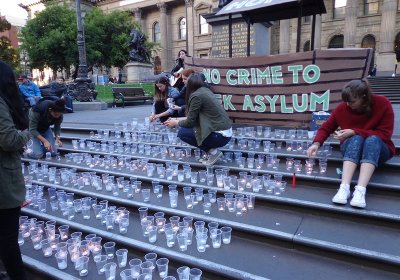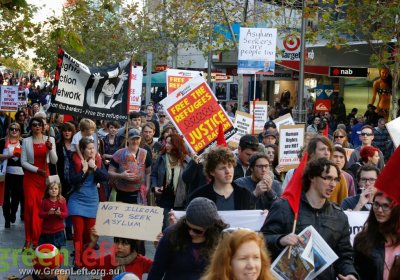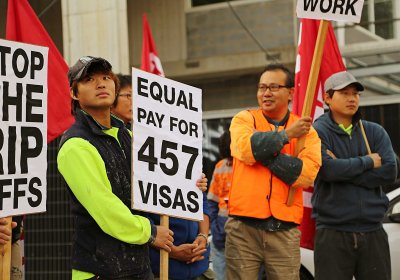About 100 people attended a vigil for refugees in Melbourne on November 15. The action was initiated by Secondary Students for Refugee Rights (SSFRR).
989
Brisbane activists, academics and unionists have resolved to launch a broad community campaign to fight the Queensland Coalition government’s attack on civil liberties.
The decision was made at a forum organised by Green Left Weekly on November 12. Dr Mark Lauchs from the Queensland University of Technology, Queensland Council for Civil Liberties president Michael Cope, and assistant secretary of the Queensland Electrical Trades Union Peter Ong spoke at the well-attended meeting.
WikiLeaks published a leaked draft chapter of the Trans Pacific Partnership agreement on November 13. The leaded chapter of the propsed “free trade” deal concerned intellectual property rights — and confirms fears its provisions favour big corporations and restrict the ability of governments to regulate corporate activity.
Catastrophic climate change due to greenhouse gas emissions from industry is not merely a future threat for humanity. It is happening now.
When Super Typhoon Yolanda (known outside the Philippines by its Chinese name, Haiyan) slammed into the islands of Samar and Leyte in the Philippines’ Eastern Visayas region on November 8, and cut a path of destruction through the Visayas, it was the strongest storm ever recorded to hit the cyclone-prone Philippines.
According to some scientists, it was strongest storm to ever hit land anywhere on Earth.
It is not news to progressive people in Australia that this country is profoundly racist.
Extensive anti-asylum seeker policies and racial vilification as government policy, the extension of the Northern Territory intervention and continued discrimination in the workplace and the wider community all means people of colour face significant challenges in modern Australia.
A meeting of about 160 residents called by Moreland City Council voted unanimously to reject the proposed East West Link on November 12. The first stage of the major road project is planned to link the Eastern freeway with the Tullamarine tollway at an estimated cost of $8 billion. Residents called instead for the money to be spent on improved public transport.
Andrew Munro, from the Metropolitan Transport Forum, spoke of the need for more investment in public transport.
The Tasmanian Aboriginal community and its supporters were outraged over the Aboriginal Heritage Protection Bill that was rushed through the lower house on November 13.
Brian Wightman, minister for environment, parks and heritage, tabled the bill, which will now proceed to the upper house. This bill is intended to replace the outdated and racist Aboriginal Relics Act.
At long last the reality of the human rights crisis in Sri Lanka is appearing in the Australian media. Not just the fact that more than 40,000 Tamil civilians were killed by the Sri Lankan army in a month in 2009, but that Sri Lankans of all ethnic backgrounds continue to be subject to torture, rape, arbitrary detention, disappearance and death.
The Commonwealth Heads Of Government Meeting (CHOGM), which opened in Sri Lanka on November 15, has meant special attention is being paid to these human rights abuses.
About 200 residents blockaded Somerville Road during morning rush hour in the inner-west Melbourne suburb of Kingsville on November 12 to protest against the number of container trucks using the street.
Somerville Road is a two-lane residential road that carries 3000 trucks a day. There are three primary schools and a kindergarten nearby with 1500 children enrolled.
The protest was organised by Maribyrnong Truck Action Group (MTAG) and heard from Maribyrnong Mayor Grant Miles, MTAG president Samantha McArthur, and Merryn Redenbach from Doctors for the Environment.
The corridors of the Australian parliament are so white you squint. The sound is hushed; the smell is floor polish. The wooden floors shine so virtuously they reflect the cartoon portraits of prime ministers and rows of Aboriginal paintings, suspended on white walls, their blood and tears invisible.
The parliament stands in Barton, a suburb of Canberra named after the first prime minister of Australia, Edmund Barton, who drew up the White Australia Policy in 1901. "The doctrine of the equality of man," said Barton, "was never intended to apply" to those not British and white-skinned.
All workers are treated equal, right? Same award rates for the same work, equal pay for women and uniform national modern laws. But what about workers who are not allowed to work, such as refugees on bridging visas; or workers brought by employers to Australia on 457 visas, who are used for a short time and then sent back?
Are these workers being treated equally and how can their treatment affect the rest of us in the future?
I am a 32-year-old mother of two from suburban Perth. I am writing in regard to the case of Latifa, a 31-year-old woman of the persecuted Rohingya people of Myanmar [Burma], who recently gave birth in immigration detention. Her newborn child is in NICU [neonatal intensive care unit] and her access is strictly limited due to the harsh and inhuman policies of your department. The child has never had any contact with its father also held by your department.
- Previous page
- Page 3
- Next page










